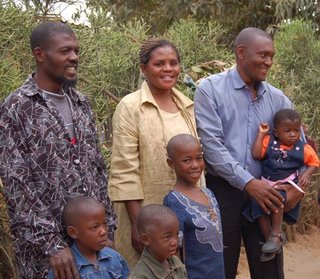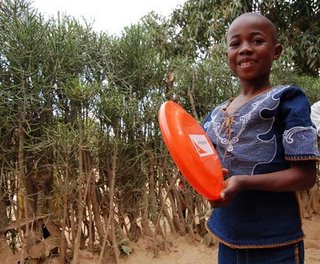That's the week we just had, and it was in one of the last places you'd expect -- the war-torn Democratic Republic of the Congo (DRC).
We visited World Vision projects in three cities in the southern part of the Congo's Katanga Province: Lubumbashi, Kipushi and Kolwesi.
Time Magazine (see "Congo: The Hidden Toll of the World's Deadliest War") called Katanga "a cursed province." An estimated 4 million people have been killed by conflict in the last eight years. Nothing short of a holocaust, even though you probably haven't heard much about it in the media. And the impact of all this trauma is nearly unfathomable, as recounted by a very interesting article in Christianity Today (see "Hope in the Heart of Darkness").
So, we wondered exactly what we were getting ourselves into as we approached Katanga Province from the south. Certainly, getting there was half the fun. We flew from Johannesburg, South Africa, to Ndola, Zambia, and were then driven overland two hours north to the border with the DRC. Then came the border crossing, a scene of utter and incomprehensible chaos. Cash changes hands at so many points when you cross a border outpost like the one we crossed. The whole crossing took about two hours and included a visit to the office of the DRC commandante in charge of the entire border crossing operation, who said he just wanted to see for himself the white people who were trying to get into his country. Hmmm.
Then another two hours north, and we arrived in Lubumbashi, as bustling and noisy a city as I have ever seen. Horns honking, goats bleating, taxi drivers calling out for fares at every hour of the day or night, music blaring: the city is a blur of frenetic activity. Add the white UN peacekeeper vehicles with their armed soldiers everywhere and it reflects an interesting atmosphere of tension, balanced with hope for a better future to come out of next month's long-awaited democratic elections.
Once in Katanga, we were grateful for the cautious supervision of the World Vision staff who accompanied us and made us feel both welcome and secure. But one of the things I had a hard time getting used to is seeing young men (hired police officers) guarding the entrance to a World Vision office ... wielding automatic weapons.
 One of the purposes of our visit was our source of greatest joy, and that was the opportunity to meet our sponsored child, Gracia, and her family in Kipushi. Gracia is a pretty and very intelligent young girl of 8. She seemed understandably shy at first. We brought a few simple gifts, including an orange "frisbee," which we had to try out for size out of doors. Our demonstration drew a curious crowd of dozens of friends and neighbors to witness a game which probably isn't played very often in the Congo!
One of the purposes of our visit was our source of greatest joy, and that was the opportunity to meet our sponsored child, Gracia, and her family in Kipushi. Gracia is a pretty and very intelligent young girl of 8. She seemed understandably shy at first. We brought a few simple gifts, including an orange "frisbee," which we had to try out for size out of doors. Our demonstration drew a curious crowd of dozens of friends and neighbors to witness a game which probably isn't played very often in the Congo!Gracia's father and mother are street vendors, and her mother was in Zambia when we visited so we missed her. But we enjoyed very much the time spent with her father, brothers and sisters, and aunt and uncle. The day's activities included attending a soccer game together, where Gracia helped us with our videotaping.
Despite the language difference, by the end of the day we had become such fast friends that parting ways was difficult indeed.

I know it's not possible, and that what we experienced was an enormous privilege, but I wish that somehow every sponsor was able to visit his or her sponsored child. If so, you could see for yourself what an amazing difference sponsorship makes.
The entire south portion of the Congo was once ruled by large mining company interests, which provided a large portion of the population with work and also built a significant amount of infrastructure ... including schools, hospitals, roadworks, public utilities and even tracts of homes ... for their communities of workers. Unfortunately these mining interests have largely collapsed, and now large portions of the population are unemployed and in desperate poverty, turning to subsistence farming and street vending in order to survive.
I found the Congolese to be a highly creative, resourceful and industrious people. They understand the importance of relationships and know how to take time to build them. They laugh a lot, sing a lot, and dance a lot. They seem to find great joy in simply living. In the midst of great challenges, they have great hope for the future.
And the challenges are enormous. Government is in large part unable to provide even the most basic services. Health care is a significant challenge, with 80 or 90% of the population suffering from malaria and various other serious illnesses. HIV and STDs are also a serious problem, particularly in the south where thousands of trucks stream across the border with Zambia every day, delivering goods from South Africa and elsewhere. In addition to their goods, the foreign truckers are exposing large numbers of girls and women to HIV.
During the week in the DRC I discovered several significant stories I am eager to tell. I visited:
- a nearly abandoned hospital which is a last vestige of hope for a number of sickle cell anemia sufferers
- a school for the deaf and mute which draws students from all over the province ... many walking long miles each day, on treacherous roads, in predawn hours to reach it
- a support center for street children, run completely by volunteers, which feeds and helps hundreds of children each day, many of whom have been abused and expelled from their homes as "sorcerers" because of suspicion that they have somehow brought AIDS on their parents
I hope to present these stories on this blog in the days to come. However, early Monday morning we catch our flight to our next destination: Harare, Zimbabwe. The one thing we weren't able to do in the Congo is to get a solid internet connection that we could use to upload our daily blogs, which is why you haven't heard from us in so long! Hopefully we will be able to post more regularly from Zimbabwe. So stay tuned! Or else check back next weekend, after we return to Johannesburg.

No comments:
Post a Comment